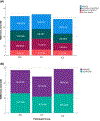Presence and characteristics of disordered eating and orthorexia in irritable bowel syndrome
- PMID: 38606723
- PMCID: PMC12118804
- DOI: 10.1111/nmo.14797
Presence and characteristics of disordered eating and orthorexia in irritable bowel syndrome
Abstract
Introduction: Orthorexia, a harmful obsession with eating healthily, may develop from illnesses characterized by dietary restriction, including irritable bowel syndrome (IBS) and eating disorders (ED). Evidence of disordered eating in IBS exists, but orthorexia has not been assessed. This cross-sectional study in adults (≥18 years) assessed presence and characteristics of disordered eating and orthorexia in IBS, compared to control subjects (CS) and ED.
Methods: IBS participants met Rome IV, and ED participants met DSM-5 criteria. Disordered eating was assessed using "sick, control, one-stone, fat, food" (SCOFF, ≥2 indicating disordered eating), and orthorexia by the eating habits questionnaire (EHQ). Secondary measures included stress (PSS); anxiety (HADS-A); food-related quality of life (Fr-QoL), and dietary intake (CNAQ).
Key results: In 202 IBS (192 female), 34 ED (34 female), and 109 CS (90 female), more IBS (33%) and ED (47%) scored SCOFF≥2 compared to CS (16%, p < 0.001, chi-square). IBS and ED had higher orthorexia symptom severity compared to CS (EHQ IBS 82.9 ± 18.1, ED 90.1 ± 19.6, and CS 73.5 ± 16.9, p < 0.001, one-way ANOVA). IBS and ED did not differ for SCOFF or EHQ (p > 0.05). Those with IBS and disordered eating had higher orthorexia symptom severity (EHQ 78.2 ± 16.6 vs. 92.4 ± 17.5, p < 0.001, independent t-test), worse symptoms (IBS-SSS 211.0 ± 78.4 vs. 244.4 ± 62.5, p = 0.008, Mann-Whitney U test), higher stress (p < 0.001, independent t-test), higher anxiety (p = 0.002, independent t-test), and worse FR-QoL (p < 0.001, independent t-test).
Conclusions and inferences: Disordered eating and orthorexia symptoms occur frequently in IBS, particularly in those with worse gastrointestinal symptoms, higher stress, and anxiety. Clinicians could consider these characteristics when prescribing dietary therapies.
Keywords: dietary therapies; disorders of gut–brain interactions; eating disorders; orthorexia nervosa.
© 2024 The Authors. Neurogastroenterology & Motility published by John Wiley & Sons Ltd.
Conflict of interest statement
CONFLICT OF INTEREST STATEMENT
The authors have no conflicts of interest to declare.
Figures



References
-
- Lacy BE, Pimentel M, Brenner DM, et al. ACG clinical guideline: management of irritable bowel syndrome. Am J Gastroenterol. 2021;116(1):17–44. - PubMed
-
- Perkins SJ, Keville S, Schmidt U, Chalder T. Eating disorders and irritable bowel syndrome: is there a link? J Psychosom Res. 2005;59(2):57–64. - PubMed
-
- Satherley R, Howard R, Higgs S. Disordered eating practices in gastrointestinal disorders. Appetite. 2015;84:240–250. - PubMed
MeSH terms
Grants and funding
LinkOut - more resources
Full Text Sources
Medical
Miscellaneous

